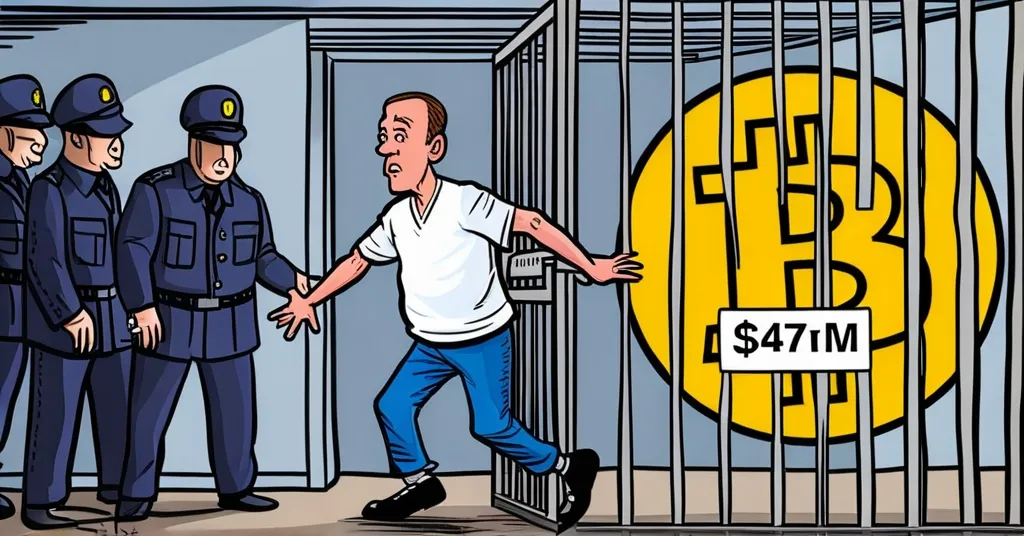Ross Ulbricht’s $47M Bitcoin Surprise: Untouched Wallets After Trump Pardon

Ross Ulbricht’s Untouched Bitcoin Wallets: A $47 Million Surprise After Donald Trump Pardon
Ross Ulbricht, the founder of the Silk Road, was recently pardoned by former President Donald Trump after serving a life sentence, only to discover that he left behind Bitcoin wallets holding approximately 430 BTC, now valued at about $47 million.
- Ross Ulbricht pardoned by Trump
- 430 BTC in untouched wallets worth $47M
- U.S. government seizure missed these wallets
- Questions linger over Ulbricht’s access to funds
Conor Grogan, a director at Coinbase, revealed a surprising detail about Ulbricht’s story. He identified approximately 430 Bitcoin across dozens of wallets associated with Ulbricht, which have been untouched for over 13 years. “I found ~430 BTC across dozens of wallets associated with Ross Ulbricht that were not confiscated by the US government and have been untouched for 13-plus years,” Grogan stated. “Back then these were probably dust wallets, now, collectively, they are worth about $47 million. Welcome back Ross.” Dust wallets refer to small amounts of Bitcoin that were considered insignificant at the time but have now grown in value due to Bitcoin’s dramatic rise.
Ulbricht’s journey with Silk Road, an online black market accessible only through special software, where users could buy and sell illegal goods using Bitcoin, made headlines worldwide. Silk Road was a pioneering platform that thrust Bitcoin into the spotlight as both a tool for privacy and a potential conduit for illicit activities. Ulbricht’s arrest and subsequent sentencing to double life plus 40 years sparked intense debate about privacy, freedom, and the role of law enforcement in the digital age.
Despite the U.S. government’s seizure of tens of thousands of Bitcoin linked to Silk Road, these specific wallets slipped through the net. Grogan did not disclose the addresses of these wallets but mentioned that they were identified from court documents and other public sources. “Not going to share the addresses, but all of them are public (cited in trial docs or directly adjacent) and tracked already by multiple sources,” he added. The value of Bitcoin has significantly increased over the years, turning what was once considered negligible into a substantial fortune.
The revelation of these untouched wallets raises intriguing questions. Grogan expressed skepticism about whether Ulbricht still has access to these funds. “Unlikely if he has the keys still stored down anywhere, I guess we will know soon enough!” he remarked. This uncertainty adds a layer of suspense to Ulbricht’s next steps following his release. Accessing such funds could involve complex legal and ethical considerations, given Ulbricht’s history and the nature of the funds.
Former President Donald Trump’s decision to pardon Ulbricht was driven by a belief in the harshness of his sentence and perceived injustices in the legal process. “I just called the mother of Ross William Ulbricht to let her know that in honor of her and the Libertarian Movement, which supported me so strongly, it was my pleasure to have just signed a full and unconditional pardon of her son, Ross,” Trump said. “The scum that worked to convict him were some of the same lunatics who were involved in the modern day weaponization of government against me. He was given two life sentences, plus 40 years. Ridiculous!”
Ulbricht’s story is emblematic of the broader narrative surrounding Bitcoin and the dark web. Silk Road was a groundbreaking platform that demonstrated the potential of Bitcoin for anonymous transactions, yet it also highlighted the challenges of regulating such activities. As Ulbricht steps back into the world, the enduring value of early Bitcoin holdings and the potential financial implications of his release remain to be seen.
The ethical and legal implications of Ulbricht accessing these funds are significant. While Bitcoin offers unprecedented privacy and financial freedom, its association with illegal activities like those facilitated by Silk Road raises questions about the responsibility of individuals with such large sums of cryptocurrency. Should Ulbricht be able to access these funds, and what does it say about the broader crypto landscape?
Key Takeaways and Questions
- What is the current value of the Bitcoin in the wallets left behind by Ross Ulbricht?
Approximately $47 million, derived from 430 BTC.
- Why were these specific Bitcoin wallets not seized by the U.S. government?
The specific reason is not clear, but it’s known that the U.S. government did seize other Bitcoin tied to Silk Road.
- Can Ross Ulbricht access the Bitcoin in these wallets?
It is uncertain, as Conor Grogan expressed doubt about whether Ulbricht still has the keys to these wallets.
- What was the reason given by Donald Trump for pardoning Ross Ulbricht?
Trump cited the harshness of Ulbricht’s sentence and perceived injustices in the legal process as reasons for the pardon.
- How did the public become aware of these Bitcoin wallets?
The wallets were identified from court documents and other public sources, as noted by Conor Grogan.
- What was the significance of Silk Road in the context of Bitcoin and the dark web?
Silk Road was one of the first platforms to use Bitcoin for anonymous transactions, highlighting both the potential for privacy and the challenges of illegal activities on the dark web.
As the crypto world continues to evolve, stories like Ulbricht’s serve as a reminder of the power and potential of Bitcoin. While the technology offers incredible opportunities for financial freedom and privacy, it also comes with significant challenges and responsibilities. Let’s keep pushing forward, embracing the good while addressing the dark sides, as we navigate this revolutionary landscape.



